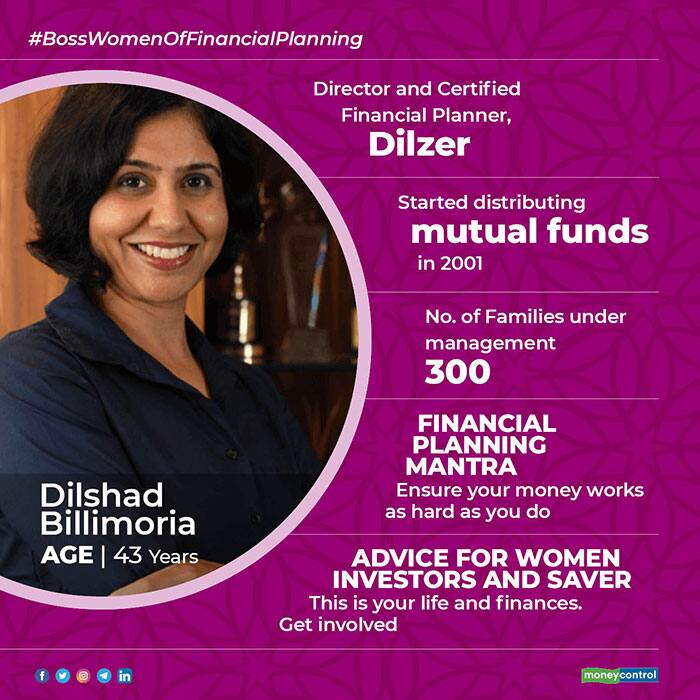



Note to readers: When it comes to money management, women have skilfully manoeuvred finances – of their families and those of investors on a larger scale. But the number of such women professional managers remains low, though. Of all registered investment advisors with SEBI (securities and exchange board of India), just about 10 percent are women. In this special five-part series, Moneycontrol personal finance profiles five women who are not only in control of their own personal finances but also guide several other women and families in managing their wealth. Yesterday we profiled Nisreen Mamaji. Today, meet Dilshad Billimoria, director and chief financial planner, Dilzer Consultants Pvt Ltd from Bengaluru.
In 2000, when Bengaluru-based Dilshad Billimoria started selling mutual funds, it was a male-dominated field. There weren’t many women in the financial distribution business. Today, she manages her own firm, Dilzer Consultants, which employs 14 people. These include certified financial planners, operations, research and office staff. Dilshad is happy with the progress and feels that although the tribe of women financial advisors is still small, it’s growing.
Also read: Renu Maheshwari on what makes women ace financial advisors
Taking the journey from a nascent stage
Dilzer Consultants advices more than 450 clients on investments, taxation, succession, and insurance planning. Five percent of these clients are women. In 2000, Dilshad remembers, Indian savers were just about warming up to the idea of investing in mutual funds. “I enjoyed being in a place where I was doing 4-5 things at one time – setting up the business, sales, execution, client follow-up and so on” she says. In those days, a financial adviser would earn income through commission on sale of financial products such as mutual funds, insurance bonds and other saving instruments.

Registered investment advisors weren’t around and charging clients was an unheard of concept.
Also read: Less than a fifth of Indian investors prioritise retirement: CFS study
As the business got established, a personal setback made her introspect and slow down. When her second child was born (Dilshad has two sons), she put systems in place so she could balance her personal and professional commitments. But soon, the business of selling mutual funds and financial products underwent its biggest disruption. The capital market regulator, Securities and Exchange Board of India (SEBI) banned entry loads in mutual funds.
Wading through disruptions
These were charges of up to 2.25 percent that mutual funds used collect upfront, which they eventually passed on to distributors as commission. With the abolishment of entry loads, distributors’ income took a hit.
In 2013, SEBI asked fund houses to offer direct plans to investors. A direct plan does not come embedded with distributor’s commission and therefore carries a lower expense ratio. It appeals to those who understand MFs well. But in 2015, SEBI also allowed registered investment advisers – who are allowed to earn their income only by charging an advisory fee to their clients and not by earning commission.
The sweeping changes in the way advisors and distributors could now sell mutual funds nudged Dilshad to become a registered investment adviser, switch to selling direct plans and also start charging her clients. The transition was initially tough, but clients understood the value of advice.
Also read: Quiz financial advisors to zero in on the right investment guide
Back then, Dilzer Consultants used to have an all-women team. Work-from-home was allowed even then as Dilshad felt it increased efficiency.
“It was plug-and-play; our consultants could connect to our office systems for back-end support. It reduced travel time and increased their efficiency,” says Dilshad. In the current pandemic times, therefore, work-from-home wasn’t new at all for Dilzer Consultants.
Insisting on women being part of meetings
Women are also an integral part of Dilshad’s financial planning approach too. She insists on both the husband and wife being there in the meetings. This, she says, helps the family align its goals and priorities. She recalls one couple where the husband’s priority for their children was to set aside amounts for their marriage, but the wife wanted to prioritise their education expenses. The husband wanted to set aside Rs 50 lakh for marriage and Rs 5 lakh for education. The wife put her foot down and got a far higher amount earmarked for the kids’ education then, Dilshad says. Women, she says, also tend to give more practical suggestions.
What are her main observations over the years about how women plan their finances?
Dilshad says that she has seen single working women wanting to become finally independent and stable.
Dilshad says that it is important for investors to open up to their financial advisors. But this trust, she adds quickly, comes with some time and frank conversations. “Our best learnings comes from our own experience of doing things and the mistakes we make,” she says. She feels it’s a blessing to manage an advisory business, as women’s inherent skills of time management, listening abilities and trustworthiness are put to best use and help in building trust with the clients.
Discover the latest Business News, Sensex, and Nifty updates. Obtain Personal Finance insights, tax queries, and expert opinions on Moneycontrol or download the Moneycontrol App to stay updated!
Find the best of Al News in one place, specially curated for you every weekend.
Stay on top of the latest tech trends and biggest startup news.